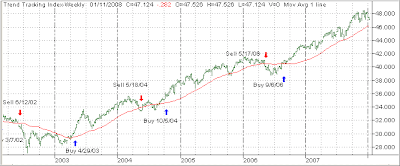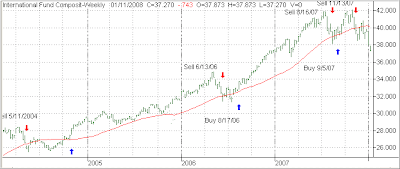 Several readers have asked if we are currently in a debt or liquidity crisis, or both. Minyanville’s Kevin Depew had an excellent write-up explaining the differences. Here is an excerpt:
Several readers have asked if we are currently in a debt or liquidity crisis, or both. Minyanville’s Kevin Depew had an excellent write-up explaining the differences. Here is an excerpt:
Here is an interesting data point that many may not have noticed. Since the Federal Reserve Open Market Committee began lowering interest rates on Sep. 18, the S&P; 500 has declined more than 7%. For those that have noticed the decline, particularly the decline in shares of Financial stocks as the PHLX Bank Index (BKX) has plummeted by 24% since Sep. 18 – a bear market by any measure – the most frequently asked question is “Why isn’t the Fed’s liquidity working?”
It’s a reasonable question, after all, central banks in both the U.S. and Europe have said without equivocation that they will provide “as much liquidity as the market needs” to “fix” the problem. So why has this liquidity not been enough to maintain and support asset prices? Because this is not a liquidity crisis, it’s a debt crisis. The difference is important, and grasping it can help us sort through a number of market actions that appear to be counterintuitive.
During a liquidity crisis, the issue is one of supplying money to those who, for whatever reason, have suddenly shortened their time preferences. Mr. Practical, writing on Minyanville’s Buzz & Banter, characterized it this way:
“Suppose there is a rumor that a large bank has made a bad loan. Because banks lend out more money than they have on deposit – this is called a fractional reserve banking system – if everyone goes to the bank and demands their money at the same time, a liquidity crisis can occur because the bank does not have enough cash on hand to satisfy the demand from its depositors.
The Federal Reserve will then step in and provide liquidity, allowing the depositor demands to be satisfied. If the rumor of the bad loan proves to be false, then the issue is one of liquidity. Time preferences soon return to a more normalized state, depositors return, everyone feels better. But, if the rumor turns out to be true, it doesn’t matter how much liquidity the Fed provides, the bank will go bankrupt.”
Similarly, the issue today is not one of temporary liquidity, time preferences being shortened out of a temporary risk aversion. The issue is too much debt supported by too little value and income generation. As a result, time preferences are retreating, risk aversion is growing, and access to credit is diminishing.
If this subject fascinates you, I suggest you read the entire article. As always, Kevin makes his points succinctly and easily understandable even for the lay person.






